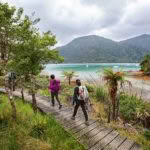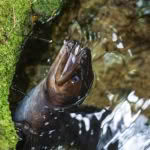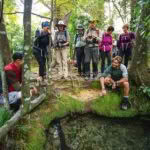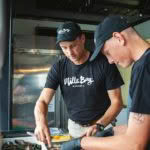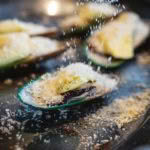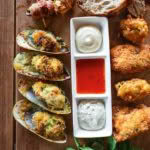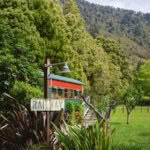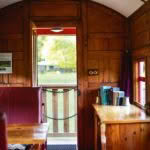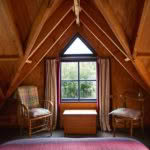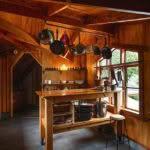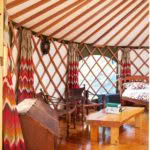From dairy farming to mussels: A Dutch-Kiwi couple go off-grid with a lodge and mussel farm in the Marlborough Sounds
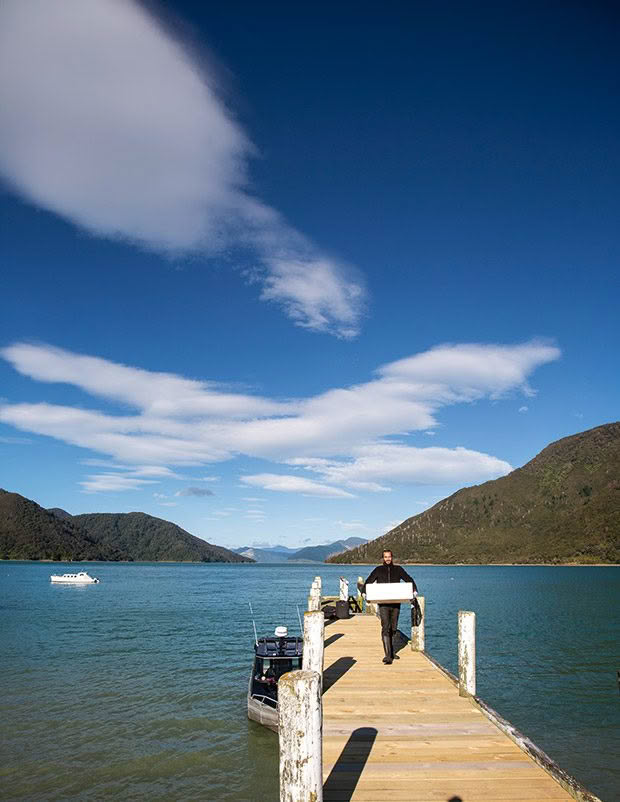
On the Track Lodge’s new manager, Victor, unloads fresh food supplies onto the community jetty, a 15-minute walk from the Nydia Bay property.
An adventurous farming family learns to cultivate tourists and mussels in a secluded Marlborough Sounds property.
Words: Sue Hoffart Photos: Tessa Chrisp
Self-doubt stalked Helen Blom’s sleepless nights for weeks after she and her family first took up the reins of a tourism business in remote Nydia Bay in the Pelorus Sound.
In many ways, the former Southland dairy farmers — Helen and husband Art, with children Nick, Maegen, Emma and Art Jnr — were particularly well-prepared for a move to an off-grid home and to run a guest lodge.
The six Bloms had just spent a year backpacking in China, Namibia, Poland and Laos and elsewhere before beginning this new life. And the decision — to leave behind schools, sports, work, friends, the farm and almost everything familiar — had been unanimous, reached after a round of family meetings.
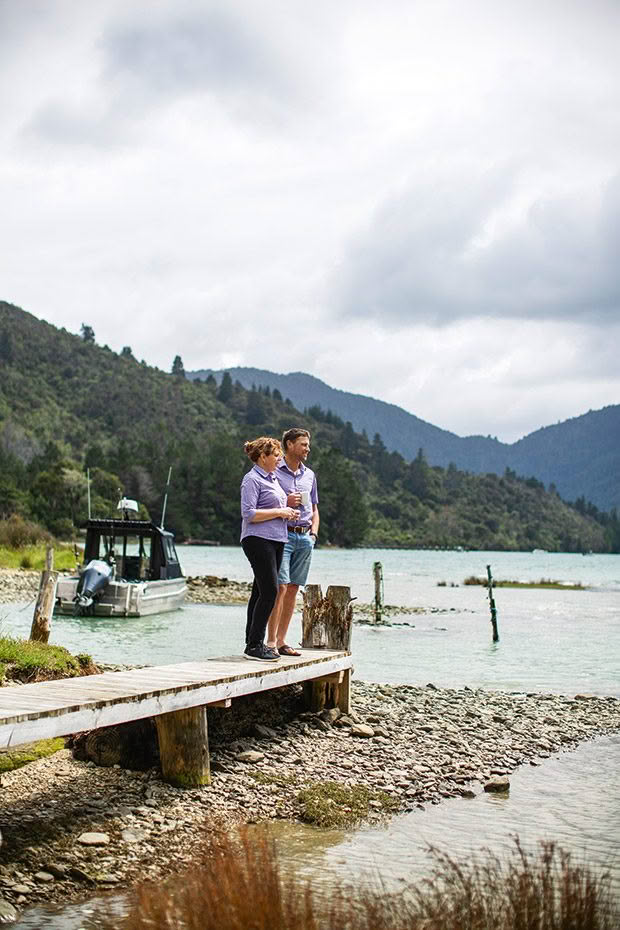
Helen’s favourite way to start the day; a cup of coffee with Art Snr beside the water immediately in front of the lodge. “A big piece of my heart is here,” she says.
Even so, Helen was uncharacteristically worried. “I had nightmares every night for the first week,” she says.
“Did we make the right decision or not?” How, she wondered, would they all cope with correspondence schooling? Would the joy of trail running or mountain biking and swimming as a family make up for the children’s separation from team sports and friends of their own age? How would they take to the hospitality trade?
None of it was easy, she admits. But it was the magic of the Sounds that made everything right, smoothed away the worries.
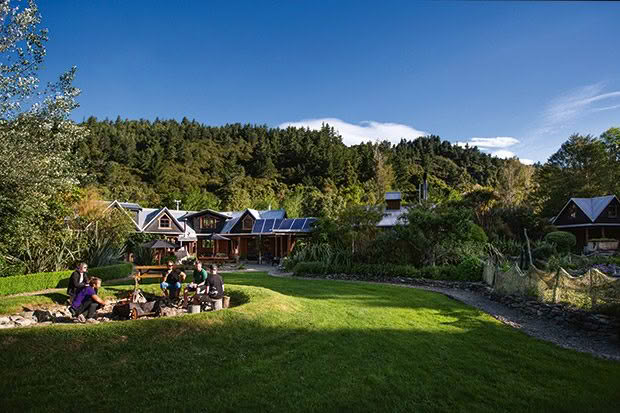
The Austrian chalet-style lodge was built in the late 1990s by a German-Kiwi couple. The Bloms are the fourth owner, and have focused on repairs and refurbishments, replacing rotten windows, painting extensively and working on the grounds.
“Carrying my coffee down to the water’s edge to watch the day begin, watching sunlight fall through clouds onto native bush to reveal 100 shades of green I didn’t know existed….”
Meanwhile, parents and children absorbed the lessons of their new environment and adapted to a life governed by the tides rolling in and out. Each morning, they met to plan the day and review guest feedback as they learned to run an accommodation business together.
“Before we moved here, I thought about all the practicalities of looking after guests,
but I never considered the interaction we’d have. And that’s the best part. People who stay here are not scared of a bit of adventure. They are active, interesting people who have enriched our lives.
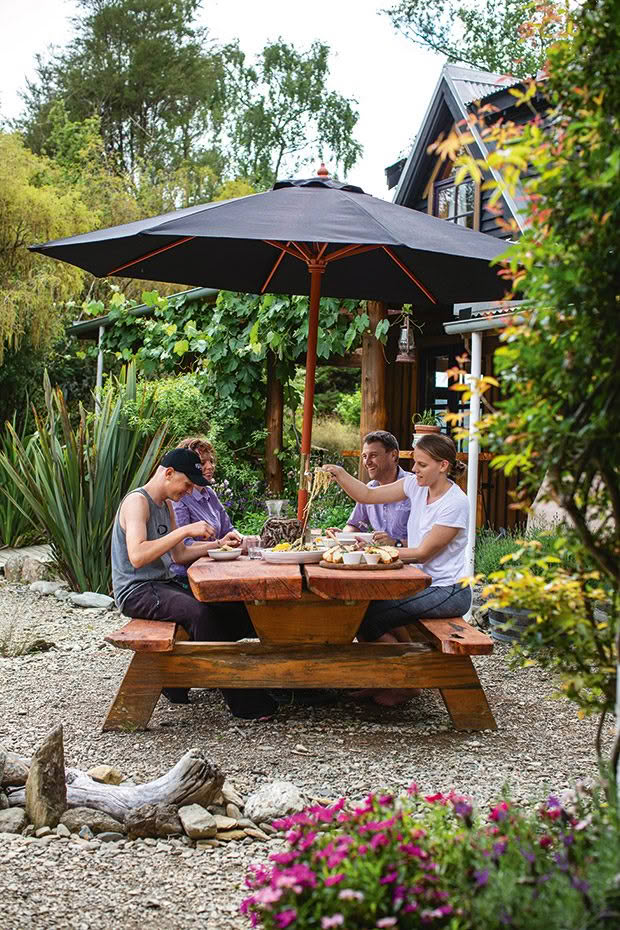
Reaping the rewards of their labour, Art Jnr and sister Maegen join their parents at the rimu picnic table to enjoy a pasta lunch made with Mills Bay Mussels.
“Running a lodge enables us to live in this place, and it makes for a lifestyle that is never lonely and never boring; the world comes to us.”
Since their move in January 2016, the entrepreneurial Bloms have also taken up mussel farming, bought a mussel-processing factory and established a mussel-tasting café in the coastal village of Havelock.
From Havelock, the journey to their home and accommodation business, called On the Track Lodge, takes 45 minutes aboard an “unsinkable” pontoon boat with a vast carrying capacity (six people, gas tanks and at least a week’s groceries). Everyone in the family can drive it.
- The Nydia Track runs through native bush between Kaiuma Bay, to the south of the lodge and Duncan Bay, to the north. Here, the track emerges onto a boardwalk in Nydia Bay.
- Maurice the eel, a well-known track attraction, resides in a pond about 45 minutes’ walk north of On the Track.
- A lodge guide teaches guests about local flora and fauna.
Orca or rare dusky dolphins sometimes accompany these trips in and out to Havelock, at the mouth of the Pelorus and Kaituna Rivers. Even stingrays regularly flit alongside as the boat enters the bush-fringed cove at the end of Nydia Bay.
Four permanent homes and a scattering of holiday houses, sporadically occupied between Labour Weekend and Easter, share the communal jetty. A mail boat calls weekly (twice-weekly in the busier season) delivering news and goods.
The Blom brood might joke it was a parental midlife crisis that sparked the move but, truthfully, Art and Helen have a longish history of leaping into the unknown. After all, both were 21 when their backpacks and gumboots first touched New Zealand soil. “And we never really left,” Art says.
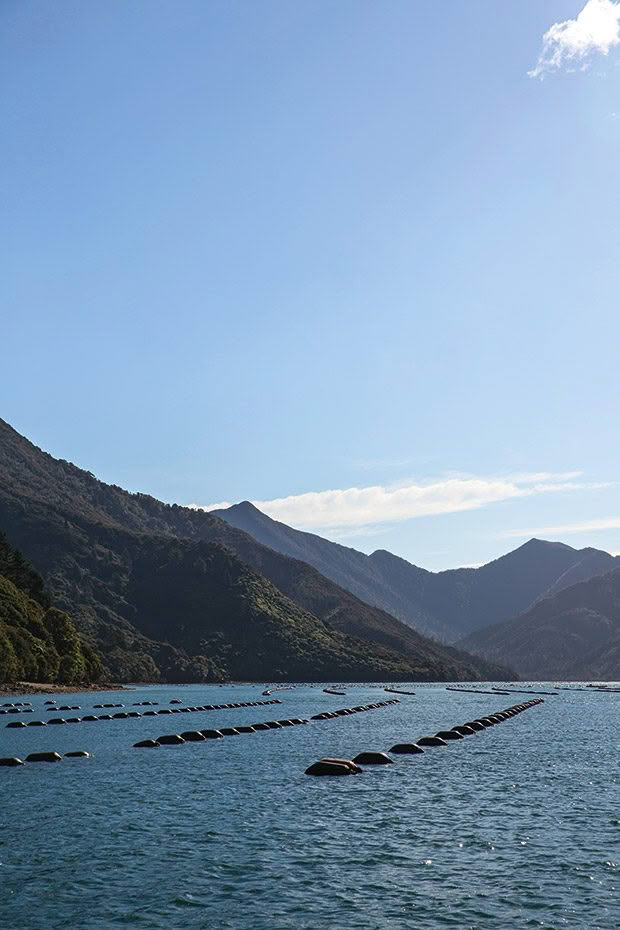
Lines of Marlborough superfood — mussels — growing in the pristine waters of Nydia Bay. Helen says it took the family time to adjust to the influence of the tides on their life, and they learned their lessons the hard way. More than once, they had to moor the boat offshore and take paddleboards or kayaks to the lodge because they had missed the tide.
In 2002, they bought a farm in the Southland town of Balfour. During the next decade, while raising their children, they bought a second dairy farm and a grazing block. Helen says they came to New Zealand at the right time and are no different from others who pour their hearts and souls into farming.
They were lucky, she says.
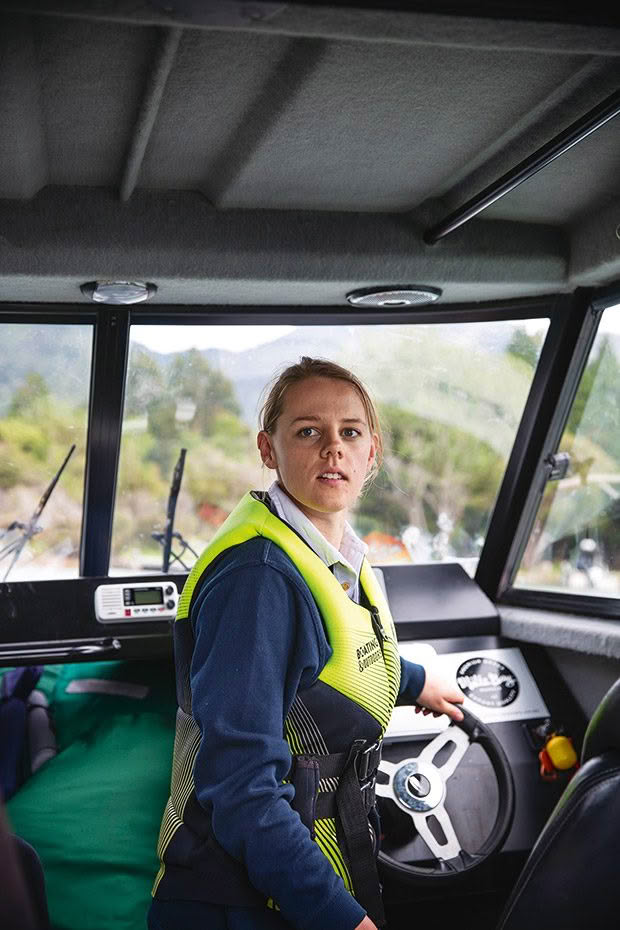
Maegen expertly navigates out of Nydia Bay, bound for Havelock, which is renowned for its Greenshell mussel industry. Everyone in the Blom family drives the boat, and considers it their lifeline to civilization.
In reality, they slogged hard to make their good luck. Yet, while they were drenching cows and sowing grass seed, grading tracks and erecting fences, joining school boards and cheering from ice-hockey sidelines, the couple dreamed of venturing back out into the world — but this time with their children.
“Being immigrants ourselves, we knew how a trip around the world would open their minds to what’s out there.”
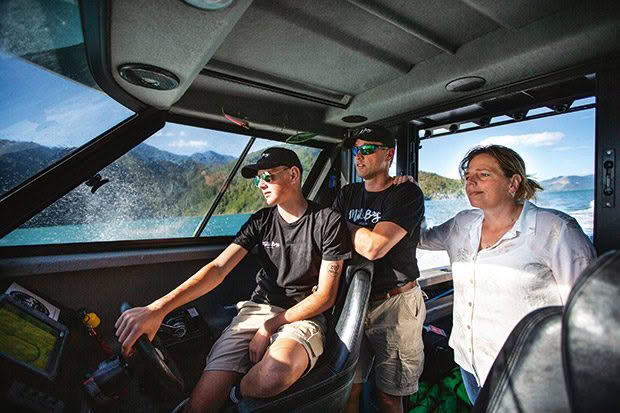
Art Jnr steers his parents towards Havelock onboard their pontoon boat.
So, they began examining every aspect of their business, first analyzing farming operations, then working on new systems and searching for the right people to manage everything in their absence. After two and a half years of meticulous planning and careful implementation, they boarded a plane bound for Beijing with four children (aged eight to 14).
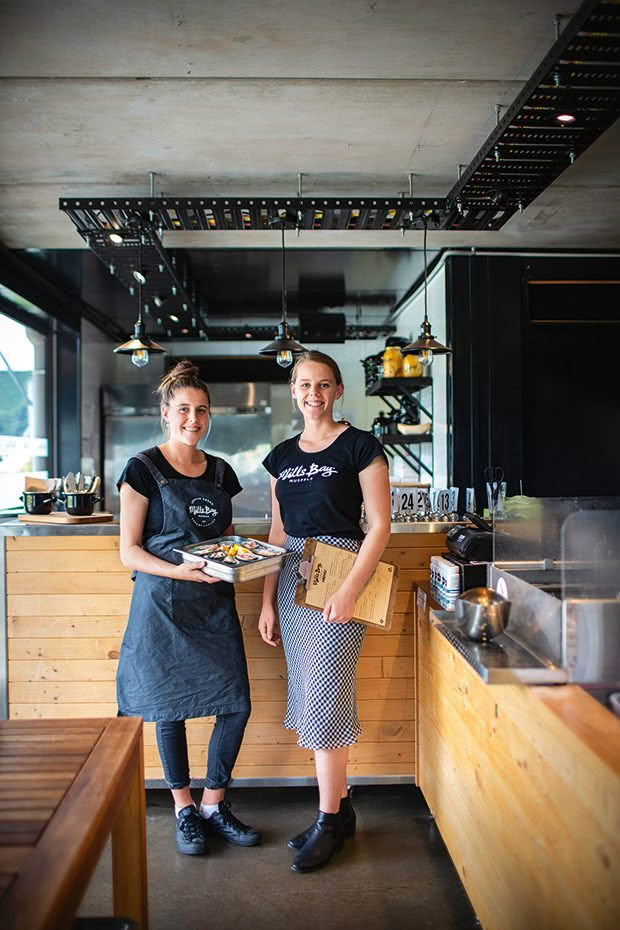
Sisters Emma and Maegen work well together, serving customers in the Mills Bay Mussels tasting room.
Schooling was practical; science and history from museums or local guides, geography courtesy of trip-planning, and maths lessons via managing currency exchange rates. The children were also in charge of the daily travel budget, collectively deciding how and where to spend money.
Helen points out that life on the road was not always harmonious. “But it was amazing. As a family, we bonded. We came back five years ago, and we still talk about it a lot. We still cook some of the food we ate on that trip, and there are jokes we share.”
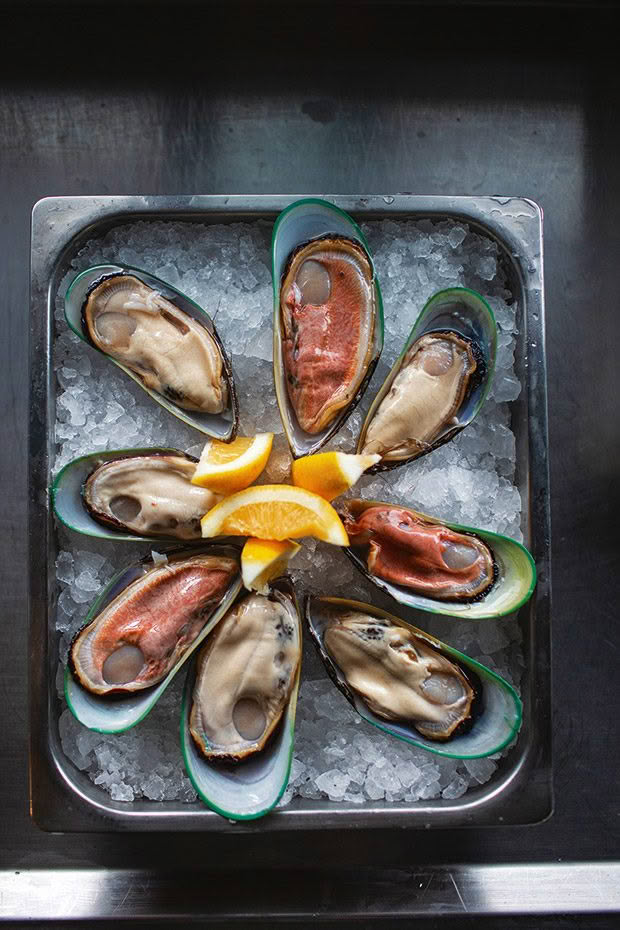
On their return to Balfour, the farm managers had coped so well in their absence, the family realized they could perhaps try something else, somewhere new.
Art and Helen began looking for a small farm in Marlborough when they came across an advertisement for an accommodation business in Nydia Bay in the remote Pelorus arm of the Sounds.
It certainly wasn’t the farm they were looking for but something about it appealed all the same.
- Art Jnr and his father open bivalves the Mills Bay way.
- Half-shell mussels with garlic, herbs and parmesan, a dish devised at the lodge.
- A sharing platter offers the shellfish five ways.
The property included a main building (with a communal kitchen, dining area, library and games room) and a separate owner’s quarters upstairs and it hosted about 900 visitors a year. Most of the guests were hikers, who had spent four or five hours on tracks cut into the bush along the ridgelines of the Sounds.
Generally, they stayed at least two nights. Accommodation included cottages, a yurt and a train carriage, which had been shipped in with the aid of a barge and crane.
- Guests can stay in a restored 1916 railway caboose, which was converted in Palmerston North. From there, it traveled to Wellington by truck, by ferry to Picton and arrived in the bay on a barge.
- The interior of the carriage, features an en suite bathroom and original seating. Guests reach the accommodation by a walkway that runs past the vegetable garden and a small orchard of pears, plums, apricots, lemon, nashi, olives and feijoas. It overlooks a grassy area favoured by deer.
During the next school holidays, Art and Helen piled the children into the car and drove north to walk the Nydia Track and spent three nights at the still-for sale lodge. What followed is a prerequisite for Blom decisions — a series of family meetings.
“The kids said, ‘Let’s do this. It’s a whole new adventure.’ I think because they’d been away together, they could see that it could work, to learn to live in this remote place altogether and do correspondence schooling.”
Everyone agreed.
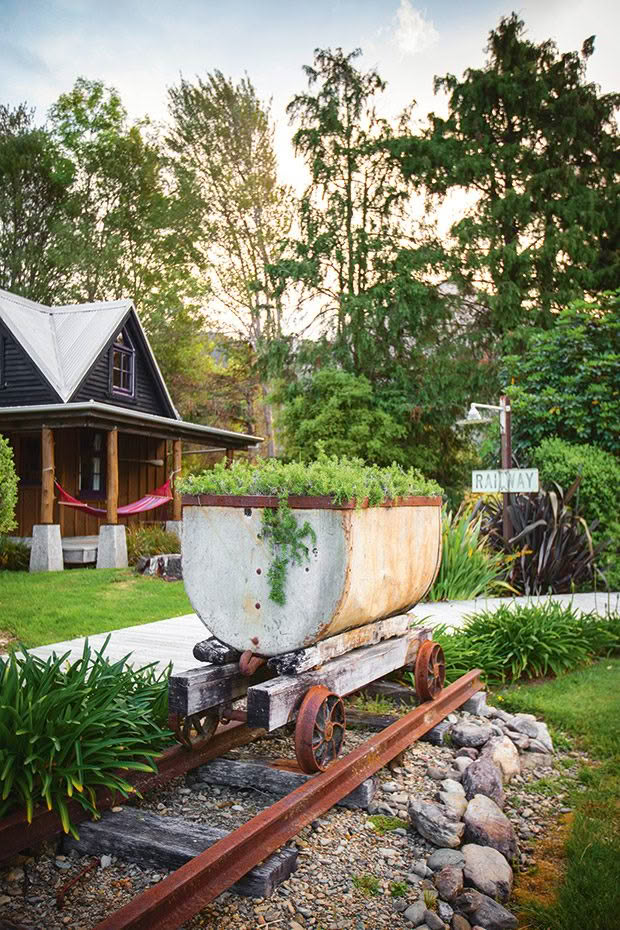
A century ago, workers built a tramway so horses could pull carts full of timber to waiting ships for transportation to Christchurch. The rail cart harks back to the bay’s milling past.
In addition to their schoolwork, there were plenty of skills for each family member to master. How to manage without shops and eateries nearby. How to unload groceries at low tide and push them along the bush track in a wheelbarrow. How to make or repair or simply do without. Where to find firewood.
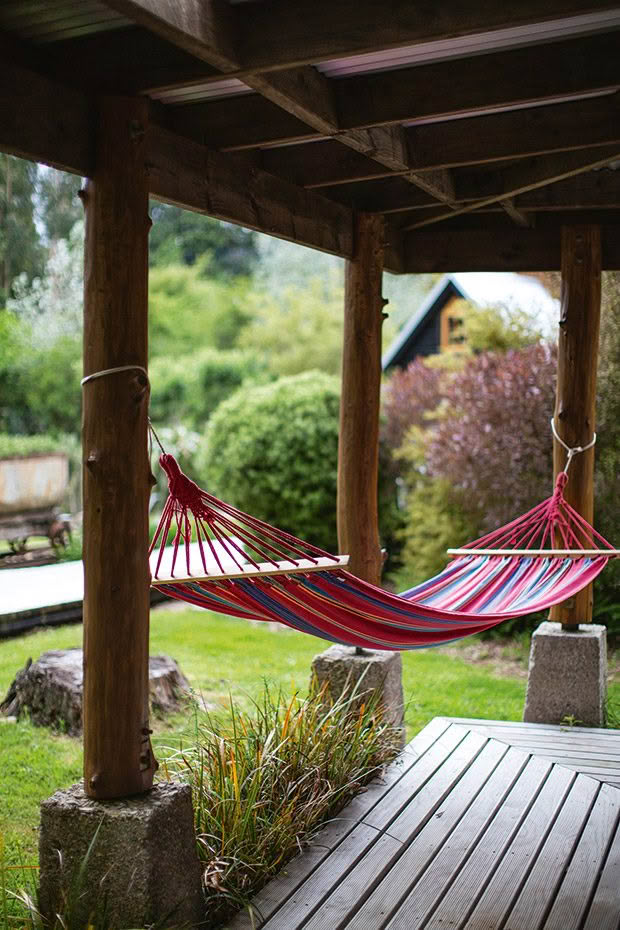
A hammock on the deck of a chalet beckons guests and their books.
How to use generators and solar power — a key lesson was never run the vacuum cleaner and washing machine at the same time. How essential a vegetable garden is. What to do when it’s raining sideways and there are 23 sets of sheets to change.
Art Jnr already had quite a few skills for a 10-year-old, including how to milk a cow, when the family took up residence.
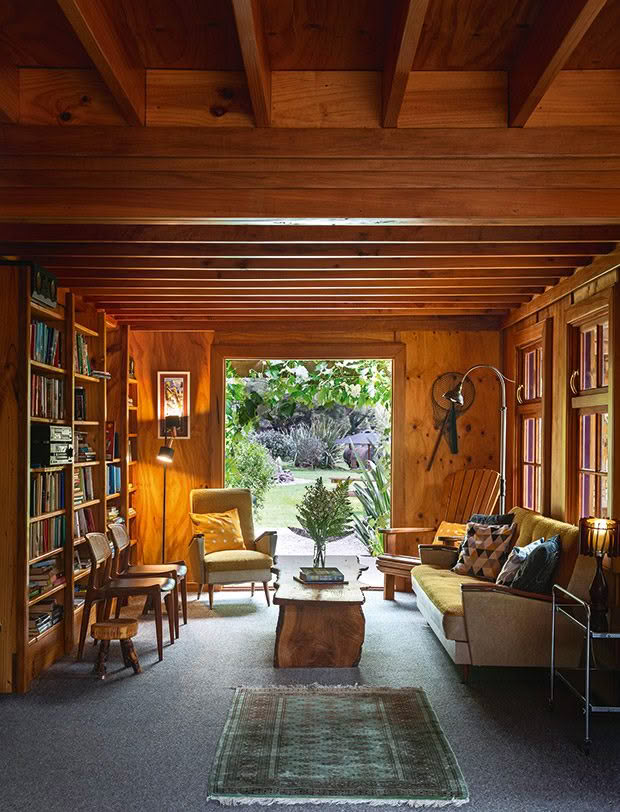
Guests gravitate to the library to read, talk, play games or lounge and gaze out through the grape-vine-framed doorway to the garden. The table and several stools are handmade.
Now, the 14-year-old can skipper a boat, spear a fish, build a picnic table, trap possums, fix a solar-power system and converse easily with international visitors. Nature-loving Emma, now 17, has proved the fastest, neatest housekeeper and bed-maker, leaving her extra time to roam on her horse, Copper.
The two younger Bloms chose to go to school in Blenheim this year and, during summer, rode their jet-ski to the bus stop in Havelock. In winter, the family moved into a rented house in Blenheim as the lengthy aquatic commute took its toll in the cold, and the kids wanted to take afterschool jobs and be able to attend sports practices.
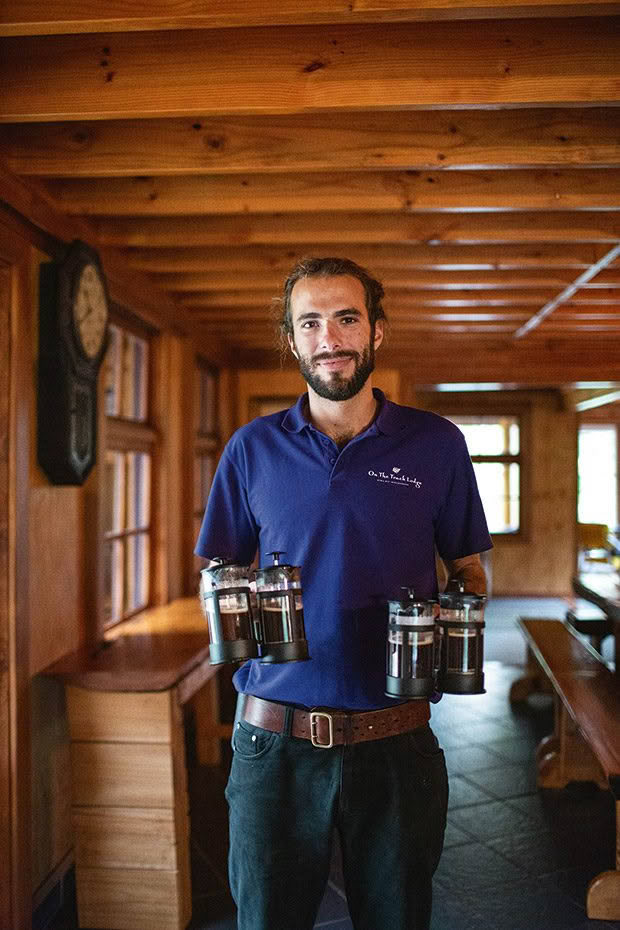
Victor has mastered the art of always being ready with coffee for weary walkers, who also receive a slice of carrot cake when they arrive.
This summer, they have brought managers in to help at the lodge so the family will commute to Nydia Bay from Blenheim between sports training and mussel business commitments.
Oldest son Nick, who is a keen hunter and hiker, spent only a year full time in the bay before heading to Lincoln University to study agriculture. He now manages the family farm in Balfour, though his parents continue to oversee all three of their Southland properties from afar.
And easy-going Maegen? The 19-year-old is studying commerce at Victoria University in Wellington and is a key contributor to the family’s Mills Bay Mussels business, providing marketing and sales support during term time as well as practical help during holidays.
- An upper-storey chalet room, overlooking the garden, is part of the lodge complex, which was constructed by the original owners and their team of craftspeople and labourers over several years.
- “Food is a big part of life,” says Helen, who dubs her rustic, practical kitchen the soul of the lodge.
- A Mongolian-style yurt, with its five beds, is a favourite glamping sleepover spot for the children’s friends. Helen loves the spaciousness and the light as well as the smell of the timber framing.
- The interior of the carriage, features an en suite bathroom and original seating. Guests reach the accommodation by a walkway that runs past the vegetable garden and a small orchard of pears, plums, apricots, lemon, nashi, olives and feijoas. It overlooks a grassy area favoured by deer.
While Art Snr appreciates the beauty of their lodge-based lifestyle as much as anyone, life in the slow lane is not for him. Within six months of their arrival at Nydia Bay, the ever-curious businessman was noticing neighbouring mussel farms and casting about for a new project.
Shares in a couple of mussel farms led to the purchase of a mussel-processing plant in Havelock and increasing enthusiasm for the shellfish and its culinary potential. Art will tell anyone who listens that mussels ought to be shucked raw, then cooked; never steamed open first.
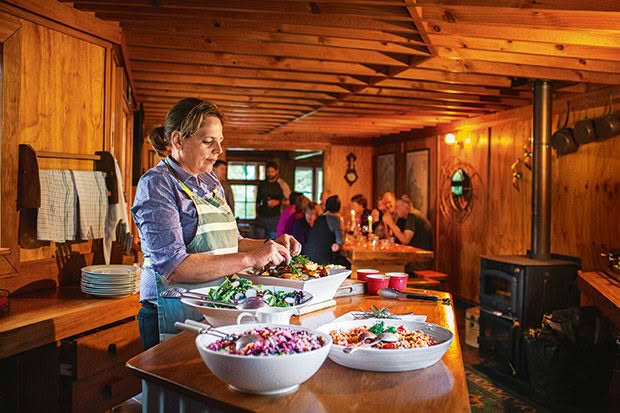
Helen prepares dinner for the tramping group in the downstairs guest kitchen using produce from the lodge garden. Living remotely made Art attempt vegetable gardening again. He had abandoned it in Southland the year Helen woke to find 100 heifers stomping through the veggie patch. “We discovered cows don’t like leeks or coriander but they’ll eat anything else”.
Maegen was 16 when she began attending business meetings with her father, accompanying him as he immersed himself in the mussel industry. It was the teenager’s idea to create a café to showcase their favourite bivalve. Between correspondence lessons, she established the Tasting Room & Eatery in a corner of the newly acquired mussel-processing plant.
Art says mussel farming and dairying share plenty of common ground with their particular brand of personal, hospitable tourism. “In business terms, lots of skills are transferable, and our businesses are all working with people, the climate and nature. As a family, we get huge satisfaction out of bringing this together.”
NO LOOKING BACK
It took young Dutch backpackers Art and Helen Blom two months to decide they would not leave New Zealand.
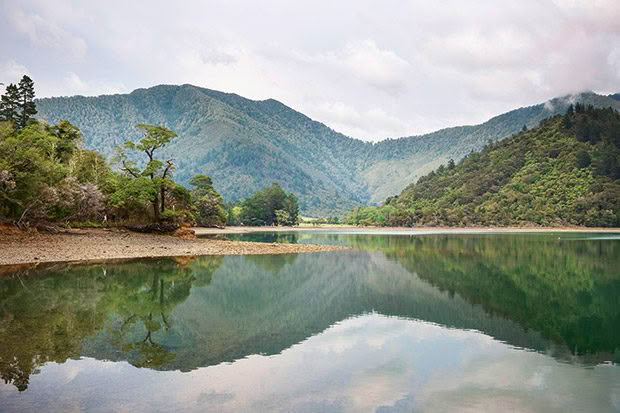
One of the many moods of Nydia Bay; still, serene and shrouded in cloud. Across the bay is the Kaiuma Saddle, which the family has walked numerous times.
The couple arrived in Ashburton with newly minted agricultural degrees in winter 1996, eager to spend a year absorbing knowledge while working on a dairy farm. By spring, they had abandoned their plan to return home and take charge of Helen’s parents’ farm. Difficult as it was to announce their intentions to family, Helen’s father swept away their guilt.
“He came and saw what we were doing and said, ‘If I were young, I would do the same.’ That was so important to us.” onthetracklodge.nz
THIS SUMMER WE’LL BE…
Playing: The Art of Conversation, an Australian wordsmith game featuring 300 “conversation starter” cards. “We love playing this as a family or with friends, or with anyone who we can convince to play it. It gives lots of insights into the people answering the questions and is hilarious at times.”
Reading: We have all been reading parts of Sapiens: A Brief History of Humankind and 21 Lessons for the 21st Century, both by Yuval Noah Harari. Each is fascinating.
Eating: Our favourite way to eat mussels is to shuck them while raw, then cover them with garlic/parmesan/herb butter and a sprinkle of panko breadcrumbs before popping them under the grill. To prise open a raw mussel, use a thin, flexible, blunt knife and open on the beard side of the shell to slice through the adductor muscle. Find a video with detailed how-to instructions at millsbaymussels.co.nz
Love this story? Subscribe now!
 This article first appeared in NZ Life & Leisure Magazine.
This article first appeared in NZ Life & Leisure Magazine.
